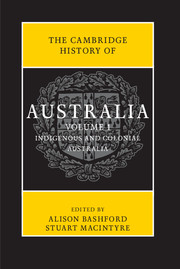Book contents
- Frontmatter
- Contents
- Abbreviations
- List of maps
- List of figures
- List of tables
- Notes on contributors
- Map
- Preface
- Introduction
- PART I
- PART II
- 11 Environmental transformations
- 12 Population and health
- 13 The economy
- 14 Indigenous and settler relations
- 15 Education
- 16 Law and regulation
- 17 Religion
- 18 Colonial science and technology
- 19 Gender and colonial society
- 20 Art and literature: a cosmopolitan culture
- 21 Empire: Australia and ‘Greater Britain’, 1788–1901
- 22 Colonial Australia and the Asia-Pacific region
- 23 The Australian colonies in a maritime world
- Further reading
- Chronology
- Index
- Frontmatter
- Contents
- Abbreviations
- List of maps
- List of figures
- List of tables
- Notes on contributors
- Map
- Preface
- Introduction
- PART I
- PART II
- Further reading
- Chronology
- Index
15 - Education
from PART II
Published online by Cambridge University Press: 05 November 2013
- Frontmatter
- Contents
- Abbreviations
- List of maps
- List of figures
- List of tables
- Notes on contributors
- Map
- Preface
- Introduction
- PART I
- PART II
- 11 Environmental transformations
- 12 Population and health
- 13 The economy
- 14 Indigenous and settler relations
- 15 Education
- 16 Law and regulation
- 17 Religion
- 18 Colonial science and technology
- 19 Gender and colonial society
- 20 Art and literature: a cosmopolitan culture
- 21 Empire: Australia and ‘Greater Britain’, 1788–1901
- 22 Colonial Australia and the Asia-Pacific region
- 23 The Australian colonies in a maritime world
- Further reading
- Chronology
- Index
- Frontmatter
- Contents
- Abbreviations
- List of maps
- List of figures
- List of tables
- Notes on contributors
- Map
- Preface
- Introduction
- PART I
- PART II
- Further reading
- Chronology
- Index
Summary
Individuals and societies acquire and construct knowledge in various ways. In the nineteenth century the transmission of knowledge became closely associated with specific educational institutions that promised both moral enlightenment and material improvement and benefits. Most of all, ideas of the universal school and notions of widening social access for all were born and adopted, particularly in societies of settlement such as Australia. Education seemed to promise much, especially to those of perceived merit and talent. It partly overcame boundaries of gender and class, though not the division between Indigenous populations and new settlers.
Cultures, faiths and ventures
Indigenous people had long engaged in educational practices, including the acquisition of hunting and gathering skills, initiation through ceremony and knowledge of country. Place and environment shaped these experiences. Around Sydney Harbour and Botany Bay the various language groups lived close together in 1788, catching fish by bark canoe or spear, while initiation ceremonies took place on the foreshores. Across the continent, at what is now Albany on the shores of King George Sound, the Nyungar people avoided the sea; their country was close to the edge of the great jarrah forests, although they ranged for food across a much wider domain and their young accompanied them on long journeys, learning by imitation and initiated by ceremony and tasks into understanding the surrounding environment. Such practices were part of the cultural web of education when the new settlers arrived in 1788.
The British had their own forms of apprenticeship and training, practices that were augmented in the new colony by the pressing need for skilled craftsmen. The governors brought with them Christianity as the foundation to education. The ‘word’ of God had become a guide for men and women of faith and, with the invention of the printing press, followed by the Reformation, education had become closely associated with words and numbers and the culture of the book, particularly the Bible.
- Type
- Chapter
- Information
- The Cambridge History of Australia , pp. 367 - 390Publisher: Cambridge University PressPrint publication year: 2013
- 3
- Cited by



